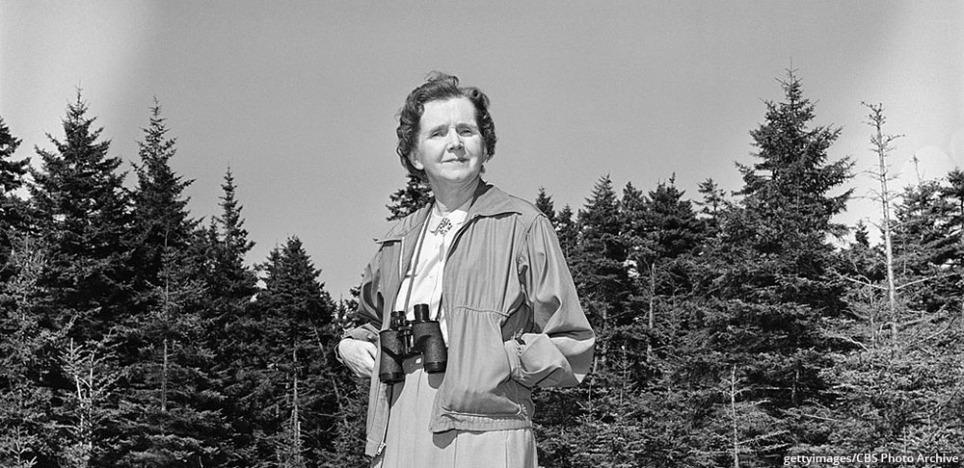Marine biologist, ecologist, and writer Rachel Louise Carson (1907 - 1964) is known for alerting the world to the dangers of pesticides through her landmark book Silent Spring. The more we notice “the wonders and realities of the universe about us,” she wrote, “the less taste we shall have for destruction."
Carson was born and raised on a family farm in Pennsylvania, where her love of nature received ample nurture. After she earned a master's degree in zoology at Johns Hopkins, her father died suddenly and she abandoned her plans to pursue a PhD, choosing to take care of her aging mother. She taught at the University of Maryland and then took a job writing radio copy for the U.S. Bureau of Fisheries. In 1936 she outscored all other applicants on a civil-service exam to become only the second woman the Bureau of Fisheries hired for a full-time professional position, as a junior aquatic biologist. Her 1941 book, Under the Sea-Wind, became a bestseller and freed her from financial concerns.
In 1945, she learned about the pesticide DDT and started doing research about its effects on the food chain. This topic was unappealing to editors, and she did not publish her influential Silent Spring until 1962. Although the chemical industry campaigned against her scientific findings, the academic community largely endorsed her claims, and soon she had also garnered public support. In 1963 she testified before President John F. Kennedy's Science Advisory Committee on the industrial-chemical assault on nature, an issue that still calls for our attention today.
 Quotes
Quotes
"Over increasingly large areas of the United States, spring now comes unheralded by the return of the birds, and the early mornings are strangely silent where once they were filled with the beauty of bird song."
-- in Silent Spring
"For each of us, as for the robin in Michigan or the salmon in the Miramichi, this is a problem of ecology, of interrelationships, of interdependence. We poison the caddis flies in a stream and the salmon runs dwindle and die. We poison the gnats in a lake and the poison travels from link to link of the food chain and soon the birds of the lake margins become its victims. We spray our elms and the following springs are silent of robin song, not because we sprayed the robins directly but because the poison traveled, step by step, through the now familiar elm leaf-earthworm-robin cycle. These are matters of record, observable, part of the visible world around us. They reflect the web of life — or death — that scientists know as ecology."
-- in Silent Spring
"We stand now where two roads diverge. But unlike the roads in Robert Frost's familiar poem, they are not equally fair. The road we have long been traveling is deceptively easy, a smooth superhighway on which we progress with great speed, but at its end lies disaster. The other fork of the road — the one less traveled by — offers our last, our only chance to reach a destination that assures the preservation of the earth."
-- in Silent Spring
"Those who dwell, as scientists or laymen, among the beauties and mysteries of the earth are never alone or weary of life. Whatever the vexations or concerns of their personal lives, their thoughts can find paths that lead to inner contentment and to renewed excitement in living. Those who contemplate the beauty of the earth find reserves of strength that will endure as long as life lasts."
-- in The Sense of Wonder
 Spiritual Practices
Spiritual Practices
Listen to Rachel Carson describe the importance of balance in nature:
Take a walk today during which you observe what's happening with nature near you. What aspects appear to you to be well-balanced? Where do you notice imbalances, such as litter, traffic fumes, or new construction taking over natural habitats? Look for one thing you can do to help restore balance.
